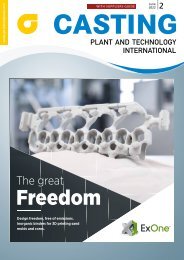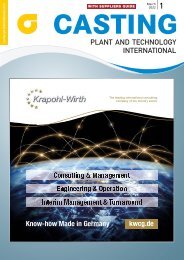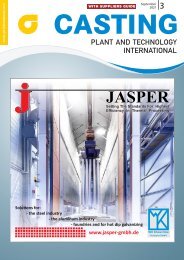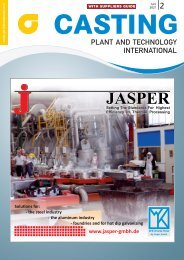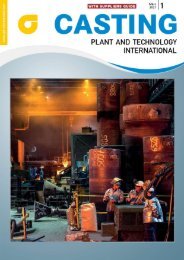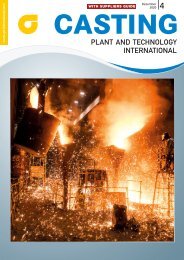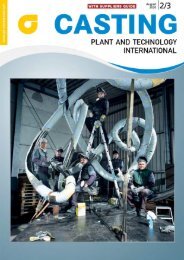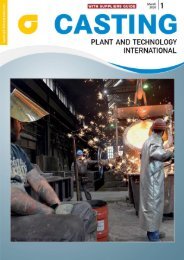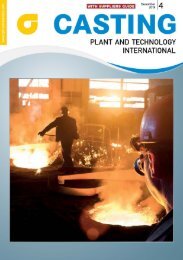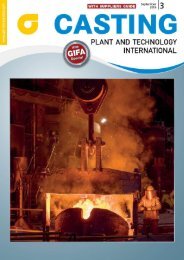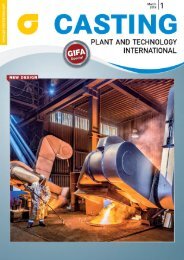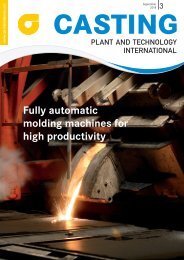CPT International 02/2019
- No tags were found...
Create successful ePaper yourself
Turn your PDF publications into a flip-book with our unique Google optimized e-Paper software.
ut also the design, joining and production<br />
technologies.<br />
Automation<br />
Production processes and information<br />
technologies interact closely with one<br />
another nowadays. Products, production<br />
plants and operating materials can<br />
be networked with one another due to<br />
their automation – and thus react more<br />
intelligently and faster to improve processes<br />
in real time. This reduces operating<br />
costs and counteracts the shortage<br />
of skilled labor. Lean, flexible and sustainable<br />
production is vital for<br />
safeguard ing future competitiveness.<br />
New business models and market<br />
participants<br />
The digital transformation is subjecting<br />
companies to more rapid change than<br />
has ever been experienced before.<br />
Whereby rigid corporate structures<br />
must be disrupted and transformed.<br />
New business models should be universally<br />
coordinated and aligned upon the<br />
digital changes, while reflecting a company’s<br />
core competences.<br />
In the global information age, information<br />
and knowledge are available<br />
rapidly anywhere and at any time.<br />
There is thus global competition for<br />
Figure 1: The use of a digital twin can<br />
support the work of employees in factories<br />
with, for example, sensors, robots<br />
and virtual reality.<br />
products, processes and services, as well<br />
as resources. Individual customer-specific<br />
products are increasingly forcing<br />
themselves into the spotlight, so it is<br />
important to create innovative products<br />
and services. But factors such as the<br />
alignment of the entire value creation<br />
chain, and the search for cooperating<br />
partners and additional competences,<br />
involve important fundamental decisions<br />
that must be made.<br />
Changes in skills profiles and<br />
personnel requirements<br />
The requirements for personnel and<br />
their skill sets will change a lot in<br />
future. Companies increasingly require<br />
skilled employees with a comprehensive<br />
knowledge of IT, as well as an awareness<br />
of process, production and logistical<br />
structures. Specialists will be needed<br />
with a deep understanding of planning<br />
and the implementation of complex<br />
interactive data-based work processes.<br />
The digital transformation will therefore<br />
not only lead to employees being<br />
supported by machines and robots, but<br />
also to new jobs with new qualification<br />
requirements.<br />
All these megatrends have profound<br />
effects on the development of products<br />
and processes within the factory. The<br />
upcoming changes should be exploited<br />
as opportunities to fundamentally<br />
shape the company of the future and<br />
thus meet new paradigms. From the<br />
factory planner’s point-of-view, the<br />
planning methods will remain the same<br />
– only the content, structures and markets<br />
will be different. Whereby the<br />
objective will be to plan the factory of<br />
the future in such a way that it operates<br />
highly efficiently, its products and processes<br />
are self-monitoring, short delivery<br />
times can be guaranteed, and production<br />
waste and rejects are reduced<br />
to a minimum.<br />
Digitalized processes in the<br />
foundry<br />
Corporate processes are continuously<br />
being permeated by the technologies of<br />
digitalization – so the cycles of production<br />
factories are also changing. New<br />
technologies must be integrated into<br />
the company’s own solutions in order to<br />
cope with this change. Whereby the<br />
existing value creation chain, and all<br />
CASTING PLANT & TECHNOLOGY 2/<strong>2019</strong> 21




